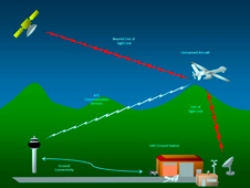By Kalwinder KaurSep 21 2012
As part of a key research project, NASA Glenn Research Center engineers are seeking solutions for the issues related to the operation of unmanned aerial vehicles (UAVs) in the US air space.
 This illustration shows the communication links between ground stations, airports, satellites and unmanned aerial vehicles. (image credit: NASA)
This illustration shows the communication links between ground stations, airports, satellites and unmanned aerial vehicles. (image credit: NASA)
As of now, civil and commercial UAVs are not permitted to be operated in national air space. However, NASA is working on to overcome the technical challenges for new aerial capabilities. Glenn researchers are focusing on communications, a key element for an efficient UAV operation.
Project engineer, James Griner informed that human intervention is still required in communications between UAVs and the Federal Aviation Administration (FAA). For this purpose, a communication system is needed.
First, radio frequencies need to be allocated with the approval from an international body of regulators. Since they are global frequencies, approval is required from several countries and that process may take several years. However, in February 2012, two bands were sanctioned by the World Radiocommunication Conference for UAV operation.
Glenn scientists have teamed up with Rockwell Collins experts to design hardware that enables pilots at ground stations to transmit data through a series of radio communication towers to the FAA and the aircraft. Testing will be conducted for the prototype radios and towers, while the aviation community will develop standards to check their alignment.
Prototype towers will be constructed in southern Ohio and at Glenn to assess integration and transmission between the towers. The ground station is being designed by the NASA Ames Research Center scientists. The objective of the project is to deliver flawless interaction between FAA air traffic controllers, towers and ground control.
Flight tests will commence this year to assess the new frequencies, and secure protocols will be developed by Griner's group to prevent hackers from accessing the communication system and taking control over UAVs during missions.
An autopilot system will be deployed by Glenn on its T-34C airplane to make a surrogate UAV that allows engineers to operate it from the ground but with a pilot on board for ensuring safety.
Griner concluded that if the technical challenges are addressed, UAVs will be employed primarily for high-altitude, long-endurance missions that are not viable with piloted aircraft.
Disclaimer: The views expressed here are those of the author expressed in their private capacity and do not necessarily represent the views of AZoM.com Limited T/A AZoNetwork the owner and operator of this website. This disclaimer forms part of the Terms and conditions of use of this website.